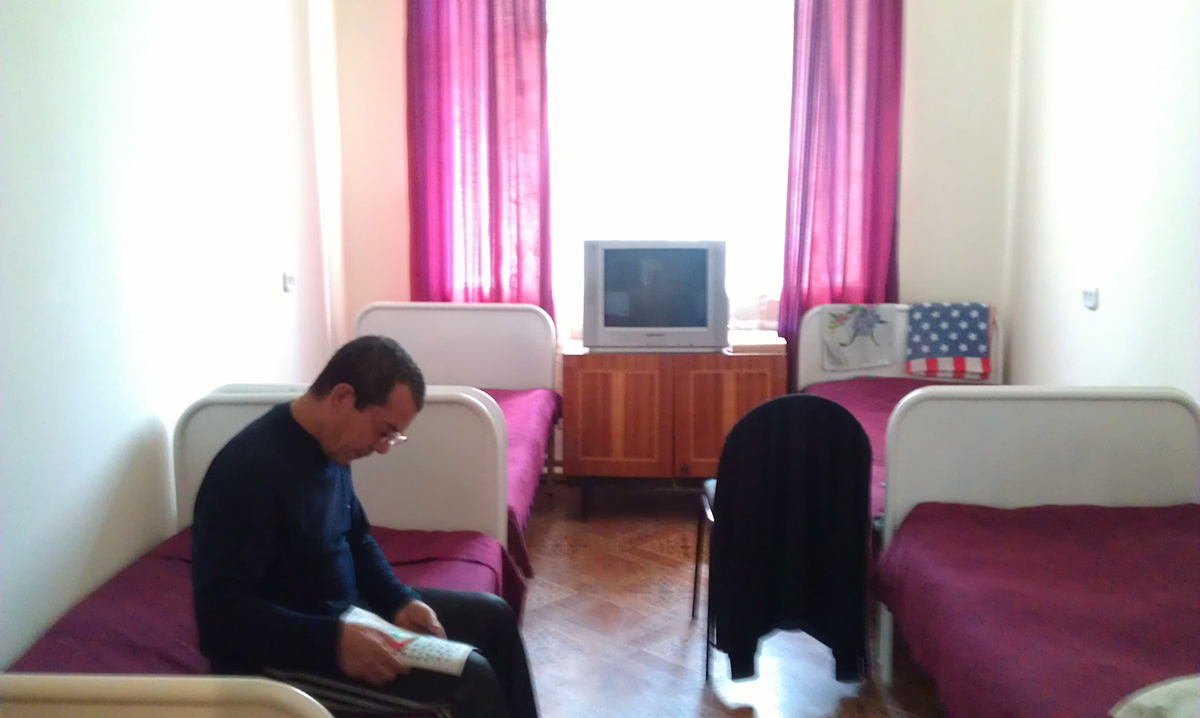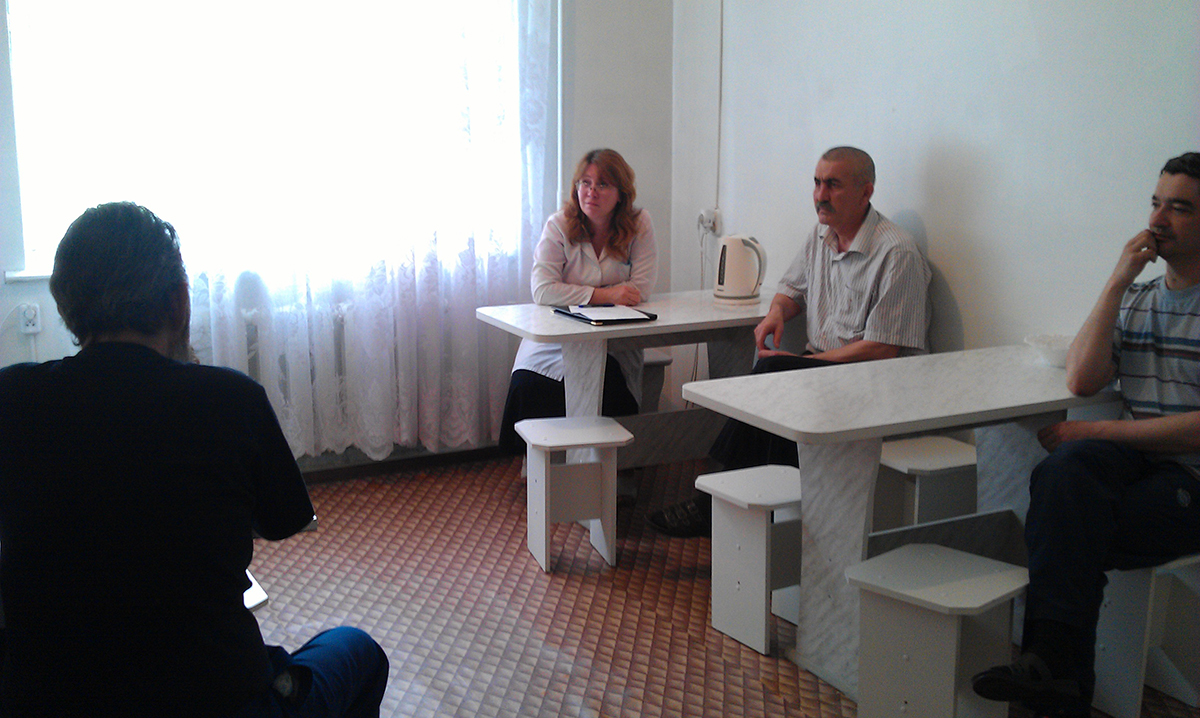


Mystery drugs, bad food, unknown rules, and a complete absence of clocks. Patients at the Narcological Dispensary in Nalchik report living in a Kafkaesque nightmare.
‘[It’s] as if we are not patients, but criminals who are serving sentences here for committing serious crimes’.
Andrei Ilchuk is a patient at the Narcological Dispensary. Located in the capital city of Nalchik, it is the only public medical institution of its kind in the republic. Due to the expenses involved with treatment in private clinics, the majority of drug addicts in Kabardino-Balkaria are treated at the Dispensary.
Though its mandated purpose to be a place of recovery, patients have found that it is more a prison than a clinic — with abysmal living conditions, social isolation, cruel and unresponsive staff, and a litany of confusing and inhumane rules.
In 2017, the number of registered drug addicts in Kabardino-Balkaria was listed at around 1,900 people, a 58% increase from 2015, according to an interdepartmental working group on countering illicit drug trafficking operating in Kabardino-Balkaria’s Prosecutor’s Office.
There are no precise statistics about the number of registered alcoholics in the republic. According to the ‘Sober Russia’ project, in November 2015, Kabardino-Balkaria was ranked eighth in terms of sobriety among Russia’s 85 federal subjects, rising to fifth place in 2018.
Short of knowledge, short of medicine
According to protocol, medicine at the Narcological Dispensary is to be distributed to patients three times a day, in addition to an injection that occurs once a day before bed.
But what that medicine is, patients say, is another question entirely.
‘It is impossible to get an answer from the nurses’ Artur, one of the patients at the clinic tells OC Media. ‘They say that they are prohibited from informing patients about them and don’t explain the meaning of this prohibition.’
Artur says that he suspects the staff are reticent to talk because the medicine the clinic bills the government for and the medicine they give to the patients is different. ‘The patients are given cheap medicines, mostly local analogues’, Artur speculates.
Additionally, Artur says these medicines are often not sufficient for the number of patients at the department where he is being treated.
‘There were days when, for example, when, during the dispensing of medicines at bedtime, other patients and I were not given pills or pricked with any injections at all. The nurses, without embarrassment, told us that there was not enough medicine for everyone at this time’, he says.
Sergey (not his real name), another patient at the clinic, tells OC Media that vitamin injections, which are supposed to be conducted daily, occur only on Sundays.
‘Despite the fact that this clinic is officially free, only those who give money to the doctors or those who buy and bring their own medicines with them are really treated here’, he tells OC Media.
According to a 13 March statement by the Prosecutor’s Office, the healthcare system in Kabardino-Balkaria is grossly underfunded. The total estimated annual cost of medicines, speciality therapeutic food, and other consumables for 2018 amounted to approximately ₽960,000 ($15,000). The national budget only provided ₽330,000 ($5,100).
The chief doctor of the clinic, Olga Udalova, did not respond to the specific claims made by the patients, but she denied that the clinic has a poor supply of medicines.
‘The supply of our medical facility is handled by the Ministry of Health, that is, the state. It holds auctions and tenders among suppliers and manufacturers, and the winning company provides us with all the necessary medicines’, she tells OC Media.
OC Media failed to reach the Drug Supply Organisation Department of the Ministry of Health of Kabardino-Balkaria for comment.
The ‘torpedo’
In addition to the available drug treatments, the clinic also practices various methods of ‘coding’ therapy to stop patients from drinking alcohol. Payment for the therapy is out-of-pocket and, according to Udalova, allows the clinic to ‘make money’.
Coding therapy is a controversial approach to treating addictions used primarily in the post-soviet space. At its core, it entails attempting to discourage drug and alcohol use by giving patients medication (including placebos) and making them believe that using addictive substances in combination with this medication will cause serious and immediate harm to their health, even death.
The clinic uses two methods of coding — the first requires a patient to be given an injection that causes them to suffer an immediate and intense negative physical reaction when they consume alcohol.
The second, more expensive method requires the surgical insertion of a microchip that contains microcrystals of Disulfiram, a drug that prevents the release of the bodily enzyme that metabolises alcohol. When a patient’s blood alcohol rises above 0.099 percent the microchip releases the drug, causing an unpleasant physical reaction.
In common parlance, this procedure is known as a ‘torpedo’. According to doctors at the clinic, drinking alcohol after this capsule has been installed can cause serious harm. Before the operation, a patient must sign waivers stating that they are aware of the danger and take sole responsibility for any consequences.

These therapies can cost patients anywhere from ₽3,500–₽6,500 ($50–$100).
Asker (not his real name), a former patient of the clinic, paid to have a torpedo implanted. Despite drinking alcohol a few days after the operation, he tells OC Media that he did not feel any adverse effects or deterioration in health.
‘I came back to demand the money paid by my parents for this operation, as I understood that the installation of this subcutaneous torpedo was pure quackery’, he says. ‘However, the doctor who made this micro-operation on me refused to return the money, saying that the capsule affects everyone differently.’
As for the injection method, according to many discharged patients, it is complete fiction. According to them, it is possible to drink a strong alcoholic beverage within a couple of hours after the injection to no ill effect.
In addition to these treatments, the rehabilitation department also earns the clinic money. It costs patients ₽1,300 ($20) per night, out-of-pocket, with a minimum stay of 10 days.
Boredom and confusion
According to several patients, while the clinic has rules of behaviour — they are unwritten, unexplained, and difficult to follow. There is also no written schedule, including for meals, medication, and bed.
There are no clocks and patients are left to rely on the Muslim call to prayer to know when to eat or take their medicine.
Boredom is also a significant issue for patients. ‘The only entertainment the patients are allowed is television’, Artur tells OC Media. ‘And it is only switched on at a certain time.’
‘By the way’, he adds, ‘there would not even be a television in the dispensary if it was not generously left by one of the discharged patients’.
Andrei Ilchuk says that patients are not informed of the rules of the clinic beforehand and only find out what they are after they violate them. ‘At these moments, some nurses are not shy to shout out the most severe profanity’, he says.
According to Ilchuk, on admission to the clinic, patients have their mobile phones taken away from them. Ilchuk says that doctors justify depriving the patients of their phones by saying that they may call their friends — other addicts — and ask them to bring either drugs or alcohol to them.
However, Ilchuk, along with other current and former patients of the clinic, says that anything can be brought to the wards since the orderlies do not check packages that visitors bring to patients, and if they do, it happens quite informally.
‘For example, they can transfer vodka into a bottle of mineral or coloured water or by mixing it with Tarkhun [tarragon soda] and Coke, so it’s not clear what the essence of the ban on mobile phones is’, Robert, a former patient of the clinic, says.
Another issue, according to Ilchuck, is a feeling of isolation at the clinic.
‘If you ignore the rare visits of relatives — and they are rare because the vast majority of patients live in villages, that is, 15–80 kilometres away from Nalchik — then it can be said that here we are in complete isolation’, he says.
‘Plus, in each chamber and in all the rooms, including the dining room and the corridors, security cameras are installed and this puts a lot of pressure on the psyche’, he adds. ‘The only exception is the toilet’.
Former patients also say there is practically no furniture in the wards, except for hospital beds and old bedside tables.
One of the patients, Hassan, says that in the first ward, which is considered one of the most comfortable, there are no chairs or tables.
He says that the food that relatives bring to patients can only be eaten in particular places, because there are only tables in the dining room, which, except for brief periods allocated for breakfast, lunch, and dinner, is locked.
‘We have to improvise — we lay out the food we are brought on our beds and use the bedside tables as tables and chairs’, Hassan says.
He claims that most of the furniture was transferred by the medical staff to their own office space, where they eat and rest.
The only ward with a table, he says, is a double room for ‘VIP’ patients.
Almost all the patients interviewed complained about the food in the clinic.
According to Artur, they eat almost the same meal every day, the portions are meagre, and there is always a shortage of bread.
Worse still, he says, the last meal takes place at 17:00–17:30, which leaves most patients going to sleep hungry by the time they retire at 22:00.
One of the workers in the narcological dispensary’s kitchen, who asked not to be named told OC Media that the amount of food supplied to the clinic does not allow them to increase the portion sizes.
Tea and tuberculosis
To kill time between meals, many patients boil and consume chifir, a strongly brewed black tea.
The use of chifir leads to a sharp increase in blood pressure and heart rate, which does not assist treatment. However, doctors and medical staff ignore its use and do nothing to put an end to the tradition, which has its roots in the prison system.
Many patients at the Dispensary have served time in prison. One consequence of this is that, according to another patient who also wished to stay anonymous, many of the former inmates carry various forms of tuberculosis, which is widespread in Russian prisons.
‘They themselves do not hide it and say that they are not contagious, but we don’t want to breathe the same air with them, eat from the same dish, or sit side by side in the dining room,’ he tells OC Media.
In addition to former felons, some of the patients are currently under investigation for minor crimes, such as petty theft or the use of cannabis, and law enforcement agencies use the clinic as an informal prison for suspects awaiting trial.
Germann was taken to the clinic after he stole a battery from a parked car.
‘I immediately admitted to the theft after the arrest, and since the crime was not serious, I was taken here, and not to the SIZO [a remand prison], which was already crowded. In a few days I will be taken from here to court, where I will most likely be given a suspended sentence’, he tells OC Media.
Another patient, who identified himself as Vitalik, says that he was also waiting for his court date while in the clinic.
‘I was caught on the street with a bag of cannabis. Soon the court session will be held and I hope that I will only end up paying a fine’, he says.






